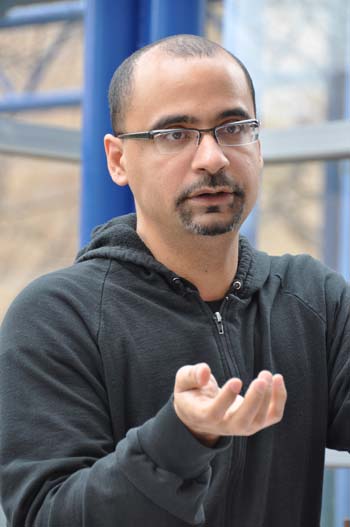
Photo by Janet Sassi
Junot Diaz is a Pulitzer Prize winner for fiction, but prefers to describe himself as a “super book nerd” who doesn’t automatically churn out superb prose.
“It takes me a long time to produce anything,” Diaz said on April 15 at Fordham’s Lincoln Center campus. “It takes me two to three years to write a short story. If I were a quitter, I wouldn’t be doing this.”
Born in the Dominican Republic and raised in Parlin, N.J., Diaz immersed himself in books from a young age. Later, he worked full time at a steel plant to support his studies at Rutgers University.
“It gave me strength of character,” said Diaz, an associate professor of writing at the Massachusetts Institute of Technology. “Going to school and working a very physically demanding job made me realize, ‘If I can do this, I’m capable of almost anything.’”
That includes winning the nation’s most-esteemed writing award.
Diaz, who is the author of the critically acclaimed short story collection, Drown (Riverhead, 1996), went on to pen The Brief Wondrous Life of Oscar Wao (Riverhead, 2007), which won the 2008 Pulitzer Prize for fiction.
Wao is an epic love story narrated by Yunior de Las Casas, the protagonist of Drown. It chronicles the life of Oscar Cabral, an overweight and atypical Dominican boy growing up in Paterson, N.J., obsessed with science fiction and fantasy novels and with falling in love. The book tells the story of a curse that has plagued Oscar’s family for generations, and life in the Caribbean since colonization and slavery.
The novel also deals heavily with the lives of Oscar’s runaway sister, Lola, his mother, Hypatia “Belicia” Cabral, and his grandfather, Abelard, under the dictatorship of Rafael Trujillo, who fiercely ruled the Dominican Republic from 1930 until his assassination in 1961.
So what kind of feedback did Diaz get from Dominicans, or any Latino group for that matter?
“I’ve been called a genius, a fraud and a token,” Diaz said, “but none of it matters. You don’t do this because approval is important to you. As an artist, approval is a way to deform your art.”
That is why Diaz chose to write a novel as opposed to nonfiction, even though Oscar Wao is rife with scathing editorials about the way Trujillo, also known as “El Jefe,” ruled the island.
“Don’t think any part of this novel is biographical. It’s a completely made-up book,” he said. “When the novel works, it creates a profound relation between the reader and material. It’s the power of art.”
Diaz said he wrote the novel because he felt it needed to be written.
“We’re talking about a traumatized society, the Dominican Republic,” he said. “For the most part, the conversation is just not being had. You really think that the elite wants anyone to do an accounting about who did what to whom during all of those years? Societies are poorly organized to have the will to confront their greatest wounds.”
Though the novel touches profoundly on the struggle Dominican people had on the island, and as immigrants who came to the United States en masse beginning in the 1960s, Diaz is careful to point out that his work will not “explain Dominicans.”
“Nor will it ever attempt to,” he said. “It’s an attempt to explain one made-up life.”
Diaz’ talk was sponsored by the creative writing program in the Department of English. Hosted by Daniel Contreras, Ph.D., assistant professor of English, Diaz also gave a reading and lecture at Fordham’s Rose Hill campus on April 15.
